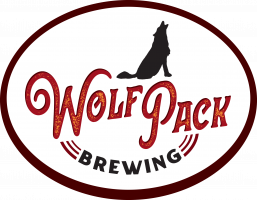Hops
|
Amount
|
Variety
|
Cost
|
Type
|
AA
|
Use
|
Time
|
IBU
|
Bill %
|
|
150 g |
East Kent Goldings150 g East Kent Goldings Hops |
|
Pellet |
5 |
Boil
|
60 min |
41.35 |
100% |
|
150 g
/ $ 0.00
|
Mash Guidelines
|
Amount
|
Description
|
Type
|
Start Temp
|
Target Temp
|
Time
|
|
47 L |
|
Strike |
67 °C |
65 °C |
60 min |
|
35 L |
|
Sparge |
76 °C |
76 °C |
90 min |
Starting Mash Thickness:
3 L/kg
Starting Grain Temp:
18 °C |
Target Water Profile
Dublin (Dry Stout)
Notes
https://shop.theelectricbrewery.com/pages/dry-irish-stout
Add the roasted barley (500L) after the 90 minute mash rest is complete. This avoids lowering the mash pH too far and reduces the chance of astringency which can occur from over-steeping highly roasted grains. Once the 90 minute mash is over, stop the mash pump, add the roasted barley, and give it a good stir to mix it into the existing grain bed. You need to stir well as otherwise the fine layer of powdery roasted barley on top may stop the flow. Start the mash pump again and continue with your mashout. The wort will be cloudy again but it will clear as the grain bed rises to mashout temperature and you hold for ~10 minutes.
Water treated with brewing salts to our Balanced flavour profile: Ca=50, Mg=10, Na=16, Cl=70, SO4=70. (Hit minimums on Ca and Mg, keep the Cl:SO4 ratio low and equal.
The flaked barley (1.4-1.5L) does not need to be milled as it has already been rolled flat and toasted. Add it to the mash as is.
While you can mill the roasted barley (500L) in your normal grain mill, to get the best colour and flavour use a good quality burr (not blade) coffee grinder to get an extremely fine grind, almost like dust.
1.5 qt/lb mash thickness.
Single infusion mash at 148F for 90-120 mins.
Raise to 168F mashout temperature and hold for 10 mins.
~90 min fly sparge with ~5.6-5.8 pH water (measured at mash temperature).
Boil for 90 minutes, adding Whirlfloc and hops per schedule. Lid on at flameout, start chilling immediately.
Cool the wort quickly to 66F to quickly lock in hop flavour and aroma and transfer to fermenter.
Aerate or oxygenate the chilled wort to a level of 8-10 ppm dissolved oxygen.
Pitch yeast and ferment at 66-68F (wort temperature).
Ferment until approximately 5 points from final gravity and then raise the temperature to 70-72F until finished.
This beer is best served on a stout faucet pushed by a nitrogen/CO2 blend to get a nice creamy head and close to flat beer, exactly how Guinness is served on tap. One inexpensive way to mimic this is to use a syringe (without needle). Pour the beer as you would normally and then suck up a syringe full and force it back into the beer, hard. Repeat 2-3 times and you'll knock most of the CO2 out of solution leaving a nearly flat beer with a creamy head. Not quite the same texture, but similar to a nitro pour.

Last Updated and Sharing

- Public: Yup, Shared
- Last Updated: 2022-02-13 04:07 UTC
For quick copying and pasting to a text based forum or email.
Click the Download as HTML file button below.
Recipe costs can be adjusted by changing the batch size. They won't be saved but will give you an idea of costs if your final yield was different.
|
Cost $ |
Cost % |
| Fermentables |
$ |
|
Steeping Grains
(Extract Only) |
$ |
|
| Hops |
$ |
|
| Yeast |
$ |
|
| Other |
$ |
|
| Cost Per Barrel |
$ 0.00 |
|
| Cost Per Pint |
$ 0.00 |
|
| Total Cost |
$ 0.00 |
|
Discussion about this recipe:
